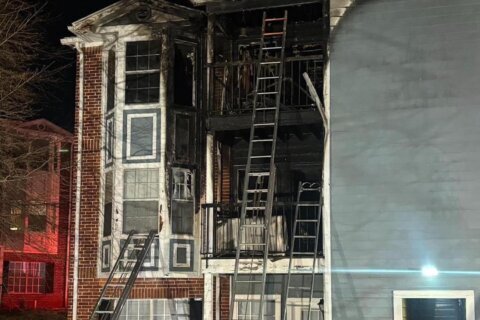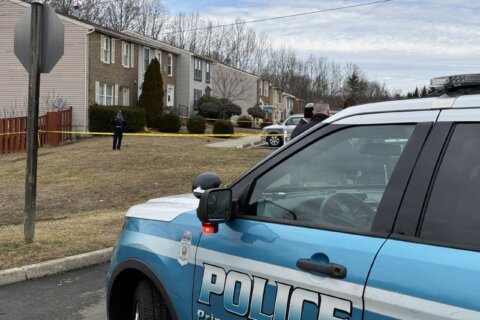This article was republished with permission from WTOP’s news partner InsideNoVa.com. Sign up for InsideNoVa.com’s free email subscription today.
This article was written by WTOP’s news partner InsideNoVa.com and republished with permission. Sign up for InsideNoVa.com’s free email subscription today.
Prince William County Public Schools are hiring tutors and math coaches as part of their effort to address the drop in test scores and learning loss that resulted from a pandemic-plagued school year.
A staff presentation to the School Board on Wednesday night provided a more detailed look at student performance last year within the division, showing pronounced drop-offs in several key areas, most notably in mathematics, where the number of passing scores fell by 29 percentage points from the 2018-19 school year. (SOL tests were not administered in the spring of 2020, when the pandemic first shuttered school buildings).
The percentage of students passing reading tests, meanwhile, fell by 7 points from 2019, though both score changes were largely mirrored by statewide results.
And while scores in both categories fell across every ethnicity the Virginia Department of Education includes in its reports, the declines were sharpest among the division’s Black and Hispanic students, widening an already significant testing gap between groups.
Among Hispanic students, the percentage of students passing reading tests fell by 10 points, while the percentage passing math tests dropped from 76% to just 39% last school year. The percentage of Black students who passed reading and math tests fell by 5 and 29 points, respectively. Declines were dramatic among economically-disadvantaged students of all backgrounds as well.
“We’re going to have to take a hard look at the fact that we had multiple years of unfinished learning in terms of addressing and covering standards for mastery,” Superintendent LaTanya McDade told the School Board. “And in math, there’s pre-requisite skills that have to occur so when those are missed, even now this year with students coming back in there are a lot of skills that teachers would have had to revisit over the course of the last two years.”
Across the four SOL subjects, the percentage of students passing with advanced scores dropped or stayed steady, with significant declines in math, science and social studies.
In terms of in-school performance, dropout rates remained roughly flat from the prior year. And at 92.78%, the percentage of students graduating on-time was higher in 2021 than it was in 2019. The percentage of 12th-grade students considered college-ready according to Virginia Community College benchmarks continued a three-year decline, however.
Roughly half as many students actually took the SOL tests last school year compared to 2019, and unlike prior years, retakes were not possible.
Those factors caution against drawing too many conclusions from the scores, said Rita Everett Goss, associate superintendent for teaching and learning.
“It is important to be careful not to make blanket comparisons between the pre-pandemic data and the pandemic data,” Goss added. “However, it is also important to note that the pandemic data highlights the specific areas we need to be intentional about addressing our achievement and opportunity gaps.”
McDade and others acknowledge that significant work is needed over the next two years to bring as many students as possible back up to speed. Division leadership is beginning to implement its two-year “Unfinished Learning Plan,” which will include staff development on accelerated learning and instructional strategies, as well as several in-classroom initiatives, including new early literacy programs and more access to tutoring.
Goss said the division has allocated $4.6 million across all 96 division schools to hire tutors. Administrators hope that consistent “high-dosage tutoring” during the school day – which includes three or more sessions per week of at least 30 minutes with targeted instruction on pre-requisite skills needed for students to be competent in grade-level subject matter – will help make up the ground that’s been lost.
On mathematics specifically, 21 prioritized schools will be assigned dedicated “math coaches.” Regular mathematics assessments will be administered to monitor progress throughout the year and adjust as needed.
As with many efforts to overcome the losses of the pandemic, though, some of the division’s efforts could be hamstrung by labor shortages. A nationwide shortage of teachers that existed before the pandemic has only worsened, and schools across the division had openings even before plans for more staff.
School Board Chair Babur Lateef told InsideNoVa last month that the division’s biggest sums of American Rescue Act Plan funds will be spent on staff, but that finding the staff could be a challenge.
“We’re having a hard time hiring even for our normal numbers,” Lateef said. “So when we decide to go out and hire more [teacher’s assistants], we’re going to do that, but the problem is finding them and finding them in time.”
But McDade has said that she’s maintaining both short- and long-term outlooks, and her plan is set to be implemented over two years, during which time some of the shortages could abate.
“Many of the strategies and initiatives that have been outlined for addressing the data is over multiple years,” she said Wednesday night. “So this is not an expectation that all of these strategies will be employed in a single year because that is not possible and all of the research is showing that the impact of the pandemic will require multiple years of recovery.”







